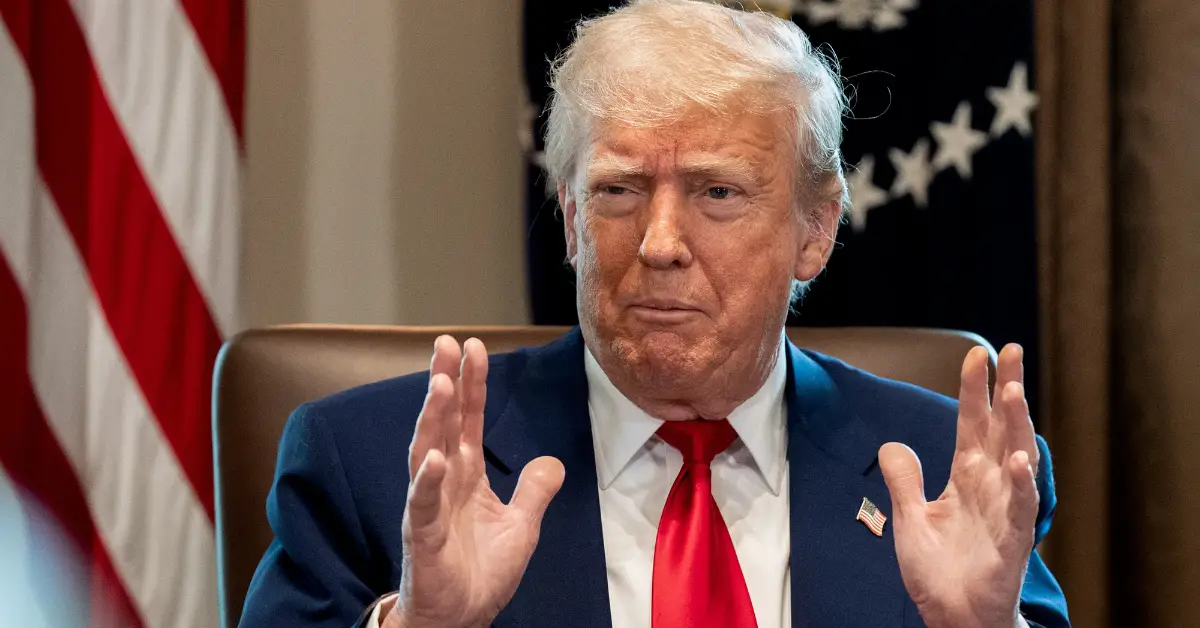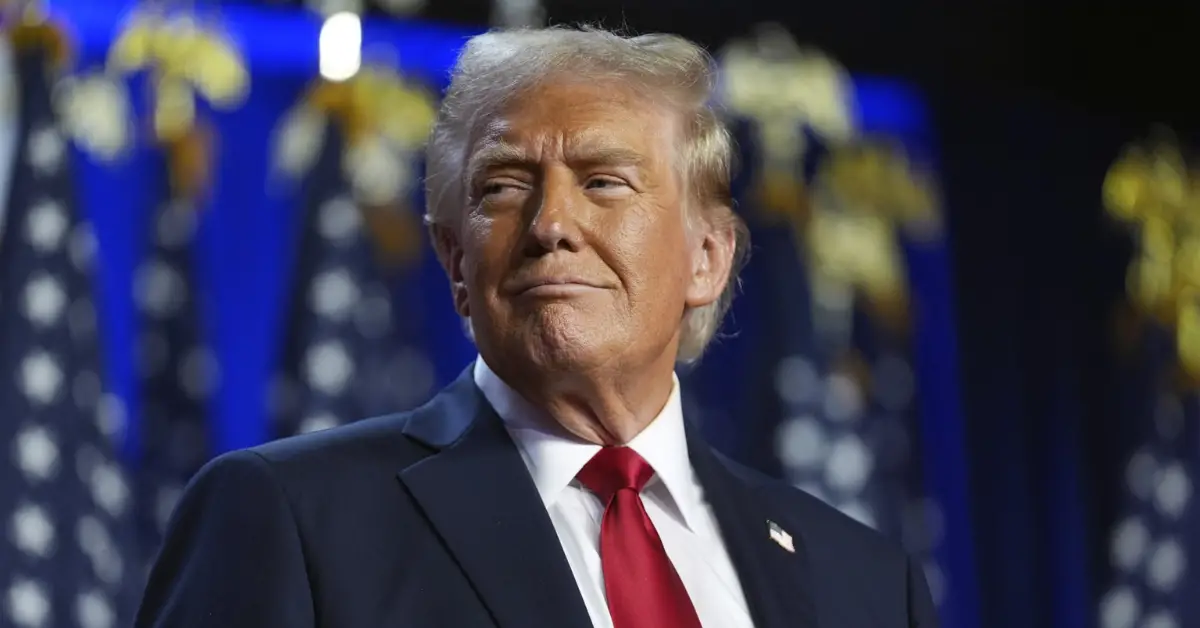Former U.S. President Donald Trump is once again making headlines, this time for suggesting that Canada should become the 51st state of the United States. In a fresh interview with NBC’s Meet the Press, Trump shared his thoughts on annexing Canada but said it’s “highly unlikely” that the U.S. would ever use military force to make that happen.
Speaking to host Kristen Welker, Trump clarified his views and even compared Canada to Greenland—a place he has often claimed could serve U.S. security interests. While he continues to promote the idea of expanding the U.S. by adding Canada, he stressed that he does not believe it will happen through war or violence.
No Military Plans, Says Trump—But He Still Wants Canada
During the May 4 interview, Trump was asked directly whether he could rule out using military force to take over Canada. His answer was surprising to some.
“Well, I think we’re not going to ever get to that point,” Trump said. “It could happen, something could happen with Greenland. I’ll be honest, we need that for national and international security.”
Then, he smiled and added, “But I think it’s highly unlikely. I don’t see it with Canada. I just don’t see it. I have to be honest with you.”
While the comment may seem offhand, it’s not the first time Trump has spoken about annexing Canada. The former president has frequently suggested that Canada would be better off as part of the United States.
Trade Disputes Add Tension
Trump’s comments come at a time when U.S.-Canada relations have been under pressure. In November last year, he met former Canadian Prime Minister Justin Trudeau at a dinner in Florida. According to reports, Trump suggested Canada should give up its independence and join the U.S.
He even mocked Trudeau on social media, calling him “Governor of the Great State of Canada.” Many Canadians saw the comment as insulting, and Trudeau faced political heat back home. Under pressure from within his party and with approval ratings dropping, Trudeau stepped down in January.
Shortly after Trudeau’s exit, Trump followed through on economic threats by placing 25% tariffs on imports from Canada and Mexico. He claimed the tariffs were related to controlling fentanyl distribution and drug trafficking. However, critics said it was just another way to pressure Canada.
The move led to widespread protests in Canada, including calls to boycott American products. Many Canadians were upset by what they saw as the U.S.’s bullying behaviour. The economic tension only deepened after that.
Canada Elects New Prime Minister
In Canada’s federal election on April 28, liberal candidate Mark Carney defeated several opponents to become the new Prime Minister. In his victory speech, Carney did not hold back. He directly addressed Trump’s repeated comments about annexation and U.S. dominance.
“As I have been warning for months, America wants our land, our resources, our water, our country,” Carney said. “But these are not idle threats. President Trump is trying to break us so that America can own us. That will never ever happen.”
Carney added that Canadians must stand united and protect their sovereignty from any foreign interference.
Trump Praises Carney, Plans to Bring Up Annexation Again
Despite the fiery speech, Trump seemed unfazed. He told NBC that Carney had called him after winning the election and that he was “very nice” during their conversation.

“I congratulated him,” Trump said. “It’s a very close victory. You know, there’s no majority or anything, so that’s going to make things a little bit difficult, I think, for him to run. But he nevertheless had a victory.”
Trump confirmed that he plans to meet Carney at the White House on May 6. During that meeting, Trump said he would again bring up the idea of Canada becoming part of the United States.
‘What a Beautiful Country It Would Be’
As usual, Trump spoke from his real estate mindset when discussing the U.S.-Canada border.
“If you look at our map, if you look at the geography — I’m a real estate guy at heart. When I look down at that without that artificial line that was drawn with a ruler many years ago — it was just an artificial line, goes straight across, what a beautiful country it would be. It would be great,” he said.
He believes that the division between the U.S. and Canada was created artificially, and merging the two could create a more unified, powerful country. However, he did not offer any clear plan for how this would happen, especially given Canada’s clear resistance.
‘We Don’t Need Anything From Canada’
One of Trump’s more controversial statements during the interview was his claim that the U.S. doesn’t need Canada at all.
“We don’t need anything. We do very little business with Canada,” Trump said. “They do all of their business practically with us. They need us. We don’t need them.”
But the facts tell a different story. According to the Office of the United States Trade Representative, Canada is one of the U.S.’s top trading partners. In 2024 alone, the U.S. exported goods worth $349.4 billion to Canada and imported $412.7 billion in return. From energy to automobiles, the two countries rely on each other heavily.
Trade experts were quick to dismiss Trump’s claim. They pointed out that millions of American jobs are linked to trade with Canada, and cutting ties would damage both economies.
What Does This Mean Going Forward?
Canadian leaders and citizens alike are taking Trump’s comments seriously. Even though he’s no longer in office, Trump remains a major political figure in the U.S. and may run again in 2024. If he does, and if he wins, the pressure on Canada could increase.
Prime Minister Carney has already stated that he will not allow Canada to become part of the U.S. under any circumstances. With a new government in place and a public ready to defend its independence, any move toward annexation would likely face strong resistance.
Still, Trump’s willingness to repeatedly mention it shows that the idea will not go away anytime soon.
Final Thoughts
While Trump says using military force to take over Canada is “highly unlikely,” his comments show that he still sees value in the idea of turning Canada into America’s next state. From trade disputes to political mocking, the U.S.-Canada relationship has taken some serious hits in recent months.
With a key meeting set for May 6 between Trump and new Canadian PM Mark Carney, it remains to be seen if tensions will cool or if the rhetoric will heat up even more. Either way, the future of this North American partnership is hanging in a delicate balance.
Disclaimer: This article has been meticulously fact-checked by our team to ensure accuracy and uphold transparency. We strive to deliver trustworthy and dependable content to our readers.




